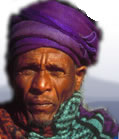|
You will need a password from Panos to view the full
transcript of the interview. To apply for a password, click here.
Once you have a password, click here to go to the beginning
of the transcript. You can also click on any section of the
breakdown of content below and go straight to the
corresponding part of the transcript.
|
| Section 1 |
Changes in environment and land productivity since the days of our fathers deforestation, gullies, soil washed away by floods. Population growth.
|
| Section 2 |
Land redistribution and income: There are no rich persons now, everyone is equal. Livestock diseases same now as in the past but less severe.
|
| Section 3-4 |
Crops cultivated; conservation of seed. Poor yields. Pests and use of pesticides which also kill grass. Rise in cost of living; increase in goods available.
|
| Section 5 |
Establishment of health clinic; venereal diseases disappearing. Hopes for the future: If we develop our area, if we plant fruits, vegetables and trees, if we stop cutting down the wild trees, if we build dams, we can get clean drinking water, irrigate our plants and lead a better life. Traditional institutions - Tertim and Qire.
|
| Section 6 |
Marriage and divorce. Marriage age for girls formerly 10-15, now as young as nine.
|
| Section 7 |
Family lineage and history of no interest to him personally. Christians and Muslims in the old days remained separate, now equal and living close together: So they become like brothers. They are useful to us and we are useful to them. Artisans - and his own belief that they eat people.
|
| Section 8 |
Crime and conflict use of physical force in the past: Now you dont talk about bravery and cowardice, for there is the law above you. General equality of status. Punishment for murder in the old days murderer driven out of community to live in the wilderness.
|
| Section 9 |
Men and women work roles. Providing for the disabled one-third of harvest given to them. Distinguishing features of Meket people wearing old clothes.
|
| Section 10 |
Respect for religious customs. Mewlid (birthday of Mohammed) day of feasting. Climatic differences between highlands and lowland; malaria in lowlands. Muslim festivals, including Eid el Fitr (end of Ramadan).
|
| Section 11 |
Skills and knowledge farming, making farm tools, weaving. Regret at being illiterate; usefulness of education and disadvantage of being uneducated: It is this, our inability to read or hear new developments which has harmed us
|
| Section 12-13 |
Communications no radio or telephone; people only hear of developments elsewhere when someone travels. Benefits of the Chinese road. Diseases mostly the same as in past but no epidemics now because of medical care.
|
| Section 14 |
Population growth attributes this to lower death rate. Drought and migration
|
| Section 15 |
Migrating to another area during the 1984/5 famine narrator worked as a shepherd, his brother as a weaver and their mother died the yarn; returned to homeland when the famine was over. Seasonal (male) migration; amount saved depends on luck and some return still unable to pay their debts.
|
| Section 16 |
Food consumption information about cereals and other food; little honey now as trees are not of the flowering type and bees are migrating. |


